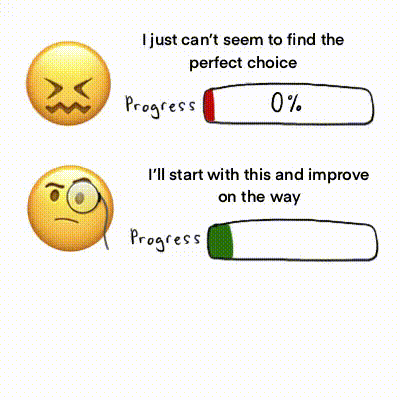More choices ≠ More happiness
Life is essentially about making decisions every day, what time to wake up, which clothes to wear, who to meet etc. Trivial choices usually do not take up that much of our mental space but when we talk about choices that are pivotal in determining how our life might turn out to be, we can’t help but mull over: “Is this the right choice?” “will I regret this in the future?”. Perpetuating questions like these might cause us to never make a choice or even become unsatisfied with the final choice we go for.
We encounter what is called “analysis paralysis”, which is the enemy of productivity and possibly, happiness. By not choosing, we shun possibilities of making the “wrong” choice. However, by not choosing, we stop ourselves from growing. By not choosing, we might lose great opportunities and end up with alternatives that are even more suboptimal.
Nothing feels better than having the power and freedom to choose because we, as mere flawed human beings like to be in control of literally everything. “The sky’s the limit” “Anything is possible” are no doubt encouraging words to inspire people to work hard and dream big. The problem lies in—having too many choices. In his book, The Paradox of Choice, the American psychologist Barry Schwartz describes the bombardment of choices makes it harder and more arduous for us to decide which one is best.
Undoubtedly, I personally have been troubled with analysis paralysis and the paradox of choice, it isn’t easy and I am still learning to tackle and overcome them when it happens. Here are some mental frameworks that I have found helpful to incorporate when we are debilitated by these challenges.
1. The nova effect
This story of a dog (check out the story in video form here) tells us that the quality (good/bad) of an experience could not be determined until later on. An event that initially seems to be a positive one may turn bad and in converse, a negative experience might not be as awful as it seems for it may be a prelude to luck. By having this in mind, the shackles of anxiety and worry might be assuaged when things don’t go as planned.
2. Action before Perfection
Sometimes it’s just wiser to go for good enough. Start with a good enough plan, a good enough draft, a good enough choice, then keep on improving from there. Herbert A. Simon theorized two styles of decision making, namely maximizers and satisficers. Maximizers, like perfectionists, tend to emphasize on picking the choice that is perfect in all aspects. Contrarily, satisficers settle on acceptable options and are happier than maximizers even after a more ideal choice arose after a decision has been made. The sweet spot between these two is where you could assign time to deliberate and act decisively without constantly worrying if that’s the right choice.

Any comments or feedback (or you just want to connect) can be sent here.